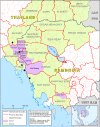Respondent-driven sampling on the Thailand-Cambodia border. II. Knowledge, perception, practice and treatment-seeking behaviour of migrants in malaria endemic zones
- PMID: 21554711
- PMCID: PMC3116495
- DOI: 10.1186/1475-2875-10-117
Respondent-driven sampling on the Thailand-Cambodia border. II. Knowledge, perception, practice and treatment-seeking behaviour of migrants in malaria endemic zones
Abstract
Background: Population movements along the Thailand-Cambodia border, particularly among highly mobile and hard-to-access migrant groups from Cambodia and Myanmar, are assumed to play a key role in the spread of artemisinin resistance. Data on treatment-seeking behaviours, knowledge and perceptions about malaria, and use of preventive measures is lacking as characteristics of this population prevent them from being represented in routine surveillance and the lack of a sampling frame makes reliable surveys challenging.
Methods: A survey of migrant populations from Cambodia and Myanmar was implemented in five selected rural locations in Thailand along the Thai-Cambodian border using respondent driven sampling (RDS) to determine demographic characteristics of the population, migratory patterns, knowledge about malaria, and health-care -seeking behaviours.
Results: The majority of migrants from Myanmar are long-term residents (98%) with no plans to move back to Myanmar, understand spoken Thai (77%) and can therefore benefit from health messages in Thai, have Thai health insurance (99%) and accessed public health services in Thailand (63%) for their last illness. In comparison, the majority of Cambodian migrants are short-term (72%). Of the short-term Cambodian migrants, 92% work in agriculture, 18% speak Thai, 3.4% have Thai health insurance, and the majority returned to Cambodia for treatment (45%), self-treated (11%), or did not seek treatment for their last illness (27%).
Conclusion: Most highly mobile migrants along the Thai-Cambodia border are not accessing health messages or health treatment in Thailand, increasing their risk of malaria and facilitating the spread of potentially resistant Plasmodium falciparum as they return to Cambodia to seek treatment. Reaching out to highly mobile migrants with health messaging they can understand and malaria diagnosis and treatment services they can access is imperative in the effort to contain the spread of artemisinin-resistant P. falciparum.
Figures
Similar articles
-
Respondent-driven sampling on the Thailand-Cambodia border. I. Can malaria cases be contained in mobile migrant workers?Malar J. 2011 May 10;10:120. doi: 10.1186/1475-2875-10-120. Malar J. 2011. PMID: 21554744 Free PMC article.
-
Characteristics and malaria prevalence of migrant populations in malaria-endemic areas along the Thai-Cambodian border.Southeast Asian J Trop Med Public Health. 2012 Mar;43(2):261-9. Southeast Asian J Trop Med Public Health. 2012. PMID: 23082578
-
The use of respondent-driven sampling to assess malaria knowledge, treatment-seeking behaviours and preventive practices among mobile and migrant populations in a setting of artemisinin resistance in Western Cambodia.Malar J. 2017 Sep 19;16(1):378. doi: 10.1186/s12936-017-2003-9. Malar J. 2017. PMID: 28927405 Free PMC article.
-
Drug resistant malaria on the Thai-Myanmar and Thai-Cambodian borders.Southeast Asian J Trop Med Public Health. 2001 Mar;32(1):41-9. Southeast Asian J Trop Med Public Health. 2001. PMID: 11485094 Review.
-
Emerging artemisinin resistance in the border areas of Thailand.Expert Rev Clin Pharmacol. 2013 May;6(3):307-22. doi: 10.1586/ecp.13.17. Expert Rev Clin Pharmacol. 2013. PMID: 23656342 Review.
Cited by
-
Assessment of malaria control consultation and service posts in Yunnan, P. R. China.Infect Dis Poverty. 2016 Oct 4;5(1):102. doi: 10.1186/s40249-016-0185-y. Infect Dis Poverty. 2016. PMID: 27716342 Free PMC article.
-
Ethnic Groups and Father's Job Influencing Nutritional Status of Children (0-30 months) from Myanmar Migrant Community in Southern Thailand.J Racial Ethn Health Disparities. 2019 Oct;6(5):944-952. doi: 10.1007/s40615-019-00595-8. Epub 2019 May 7. J Racial Ethn Health Disparities. 2019. PMID: 31065998
-
A cross-sectional analysis of traditional medicine use for malaria alongside free antimalarial drugs treatment amongst adults in high-risk malaria endemic provinces of Indonesia.PLoS One. 2017 Mar 22;12(3):e0173522. doi: 10.1371/journal.pone.0173522. eCollection 2017. PLoS One. 2017. PMID: 28329019 Free PMC article.
-
Demographic and socioeconomic obstacles to access to malaria services for Myanmar migrants in Thailand.Malar J. 2024 Aug 11;23(1):239. doi: 10.1186/s12936-024-05066-y. Malar J. 2024. PMID: 39128989 Free PMC article.
-
Malaria treatment-seeking behaviour and related factors of Wa ethnic minority in Myanmar: a cross-sectional study.Malar J. 2012 Dec 14;11:417. doi: 10.1186/1475-2875-11-417. Malar J. 2012. PMID: 23237576 Free PMC article.
References
-
- Dondorp AM, Nosten F, Poravuth Y, Das D, Phyo AP, Tarning J, Lwin KM, Ariey F, Hanpithakpong W, Lee SJ, Ringwald P, Silamut K, Imwong M, Chotivanich K, Lim P, Herdman T, An SS, Shunmay Y, Singhasivanon P, Day NPJ, Lindegardh N, Socheat D, White NJ. Artemisinin resistance in Plasmodium falciparum malaria. N Engl J Med. 2009;361:455–467. doi: 10.1056/NEJMoa0808859. - DOI - PMC - PubMed
-
- Development of a strategy towards elimination of Plasmodium falciparum parasites with altered response to artemisinins. Report of an informal consultation, World Health Organization; 2008. http://www.whothailand.org/en/Section3/Section113_263.htm
-
- Confirmation, characterization and containment of artemisinin resistance in South East Asia. A 2-year Bill and Melinda Gates-funded and WHO-led project. The Bill & Melinda Gates Foundation and the World Health Organization; 2008. http://www.gatesfoundation.org/Grants-2008/Pages/World-Health-Organizati...
-
- Partnership towards malaria reduction in migrants and conflict-affected populations in Thailand. CCM-Thailand Round 7 malaria proposal to the GFATM. 2007. http://portfolio.theglobalfund.org/Grant/Index/THA-708-G09-M?lang=en
Publication types
MeSH terms
LinkOut - more resources
Full Text Sources



